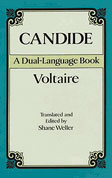
 Voltaire's
Voltaire'sCandide
Candide, the main character in the story by Voltaire, possesses qualities which make him a round character. According to E.M. Forester, the test of a round character is whether it is capable of surprising in a convincing way. While most of the other characters in the story remain the same, Candide shows feelings, surprises, and changes his philosophy on life. This does indeed make him a round character. When living in the castle of Westphalia, Candide is described as “ a youth, whom nature had endowed with the most gentle manners."
The first surprising thing Candide does is to kiss Cunegonde and is caught by the Baron of Thunder-ten-Tronckh. He is then is driven from his home to find his way in the world. He is sad and forlorn when “weeping, walked a long while without knowing where, raising his eyes to heaven.” His love for Cunegonde is undying throughout most of the story. However, once he finds his Cunegonde and sees that she has grown ugly “at the bottom of his heart Candide had no wish to marry Cunegonde.” His feelings for Cunegonde have changed. Candide also grieves for Cunegonde and Pangloss when he thinks they are dead. He feels anger when Baron does not allow him to marry Cunegonde. Candide’s emotions and feelings are constantly changing throughout the story.
In the beginning of the story, Candide seems incapable of violence. However, when Candide finds himself and Cunegonde in mortal danger kills Issachar and the Inquisitor. Cunegonde is surprised at his actions and says “How could you do it? you, naturally so gentle, to slay a Jew and a prelate in two minutes!” Candide responds, “when one is a lover, jealous, whipped by the Inquisition, one stops at nothing.” When the Baron would not give Candide permission to marry Cunegonde, he sent the Baron back to the slave ship “ the thing was executed for a little money, and they had the double pleasure of entrapping a Jesuit, and punishing the pride of a German baron.”
When in the castle of Westphalia, Candide heard the lessons of Pangloss, the philosopher “with all the good faith of his age and character.” As the story progresses, Candide questions the philosophy of Pangloss. Pangloss believes “ things cannot be otherwise than as they are, for all being created for an end, all is necessarily for the best end.” Even in the face of danger and disaster, Pangloss holds fast to his philosophy that “there is no effect without a cause.” Candide’s experiences in his travels made him reconsider what Pangloss had taught him and his own opinions begin to form. During his ordeals in this travels Candide wonders “if this is the best of possible worlds, then what are the others?” Upon arrival in El Dorado and sees all the beauty and wealth there, Candide doubts that Westphalia is the best of all possible worlds. Candide says, “This is vastly different from Westphalia and the Baron’s castle. Had our friend Pangloss seen El Dorado he would no longer have said that the castle of Thunder-ten-Tronckh was the finest upon earth.” Upon finding Cunegonde and seeing how ugly she had become, Candide regrets leaving the comforts and luxuries of El Dorado.
In the end, Candide settles down with his ugly wife, Cunegonde and life is dull. He no longer believes Pangloss’ philosophy that this is the best of all possible worlds. When Pangloss would discuss it, Candide would respond only with “let us cultivate our garden.” Even though the characters acquire wealth and are in a position to try to change some of the misery in the world, they keep to themselves and ingore the way things are. Which is pretty much how human being are, in general.



No comments:
Post a Comment